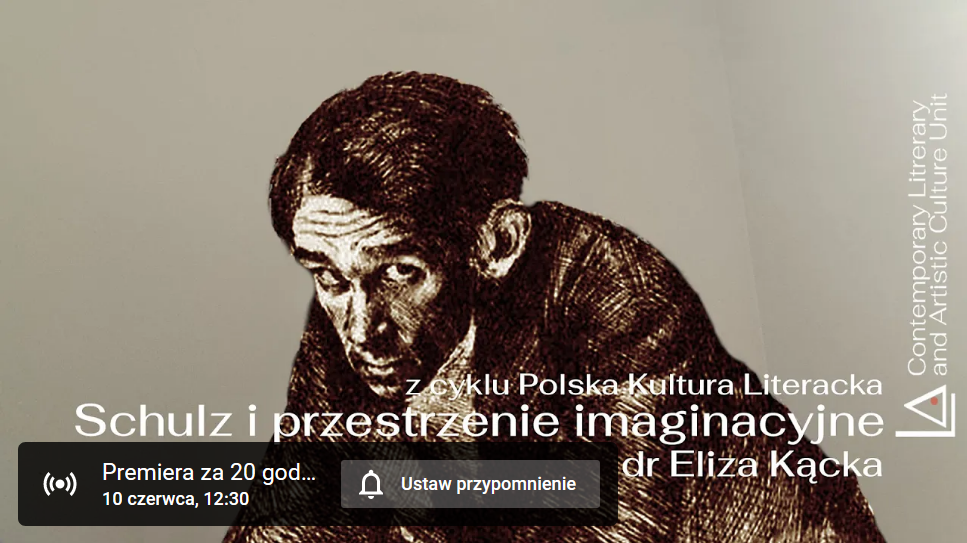Event
Schulz and imaginative spaces by Eliza Kącka / Polish Literary Culture Series: Digital Lectures Part I
Contemporary Literary and Artistic Culture Unit of the Institute of European Culture at the Polish University Abroad in London has the pleasure to invite you to a series of digital sessions. We will start with a lecture by Dr. Eliza Kącka in the formula of open access.

Abstract:
One of the distinctive features of modernity turned out to be that the (seemingly) obvious relations between space and time in prose began to be subject to numerous mutations, and these mutations to a theorizing view. In connection with the first modernist literature evaluations - at the end of the nineteenth century - the dynamics of the time-space relationship were studied more carefully, treating them as a separate material for reflection. In addition, a whole branch of reflection dealing with space emerged. Combining research on the work of the imagination with historical-topographical correctness, it allowed for many productive readings of the works of Marcel Proust and James Joyce. In Polish literature, the theoretical and written "spatial" revolution was relatively delayed but achieved more radical effects.
An illustration of one of the uncompromising, revolutionary and rebellious writing solutions is the prose of Bruno Schulz, who subordinated his work to the laws of the imagination. This does not mean that his world came out of thin air. It is easy to notice that the author of “Cinnamon Shops”, while designing his half-oneiric topographies, also points to a specific town. Nevertheless, it is the town as it was perceived by a child, and this child's perception/consciousness is attempted to be reconstructed by the author, who is committing a regress to childhood. Schulz creates mythologies of memories, which in his case has nothing to do with sentimental expeditions. Walking into his world, we enter a reality subject to the law of connotation.
___________________
Eliza Kącka is an assistant professor at the Contemporary Literary and Artistic Culture Unit PUNO and literary scholar associated with the Faculty of Polish Studies at the University of Warsaw. She graduated from the Polish Philology Department at the Nicolaus Copernicus University and Academia Artes Liberales. In 2014 she completed her PhD program in cultural studies at the Institute of Polish Literature (University of Warsaw) and received her PhD in 2015. The subject of her dissertation was: Reading as an encounter. Stanisław Brzozowski’s readings of Cyprian Norwid, Giambattista Vico, and John Henry Newman. She published a monograph on Cyprian Norwid and Stanisław Brzozowski. Her major fields of interest are: philosophical anthropology, hermeneutics, modernism in literature, and contemporary Polish poetry.
Contemporary Literary and Artistic Culture Unit of the Institute of European Culture at the Polish University Abroad in London has the pleasure to invite you to a series of digital sessions. As part of this series, our Lecturers will talk about Polish literature and introduce us to issues of interest to them in the field of analysis of literary work, comparatistics and anthropology of literature.
➤ We will start with a lecture by Dr. Eliza Kącka in the formula of open access.
➤ For whom: We especially invite all those who are interested in learning the Polish language and culture, as well as ways of unconventional thinking and talking about literature.
➤ Link to the transmission: https://youtu.be/rB_lsSZ230w
➤The lectures will be held in Polish.
➤Coordinator of the Series: Justyna Gorzkowicz
Information
See also
BIO/HUMANITIES: REPRESENTATIONS OF LIFE
The Centre for Advanced Studies in the Humanities at the Jagiellonian University organizes this conference and seminar series in collaboration with national and international partners (Postcolonial Studies Centre, University of Wrocław; Department of Polish, Russian, and Lithuanian Studies, University of Illinois Chicago). It is part of the ongoing work of the bio.humanistyka research group.
Literature in Exile Between ‘Authorship’ and ‘Translation’: The Central and Eastern European Experience
This conference aims to examine the complex relationship between ‘authorship’ and ‘translation’ in the work of the 20th-century Central and Eastern European writers in exile who were also translators. In the context of the reassessment of ‘literariness’ in the latter half of the 20th century, the conference is particularly focused on the overlapping relationship between both these concepts, which are seen as interrelated, historically variable categories of literary creativity of exiled writers in redefining themselves against the nationalist narratives. The workshop will thus contribute to the discussion on cultural translation and post-national literature in general.
'Cat in the Wet Grass' by Kornel Filipowicz – between reading and translation
You are cordially invited to the fourth meeting in the series 'Reading Filipowicz'. This time we will enter into the fascinating world of Filipowicz's works in conversation with Anna Zaranko, who translates Filipowicz's works into English.
THE 1ST BIAŁYSTOK CONFERENCE ON THEORETICAL AND APPLIED LINGUISTICS
In recent years linguistic conferences organized by the Białystok circle of neophilologists have established a strong tradition in terms of providing a forum for the exchange of views on the nature of language. It all started almost fifteen years ago, in 2002. The main aim of the conferences was to provide a meeting ground for a wide range of scholars: linguists, literary scholars, foreign language teaching methodologists, to mention but a few groups of researchers participating in the events. The conferences explored the relationship between language, culture, and social interaction. They were often organized in co-operation with French language scholars.